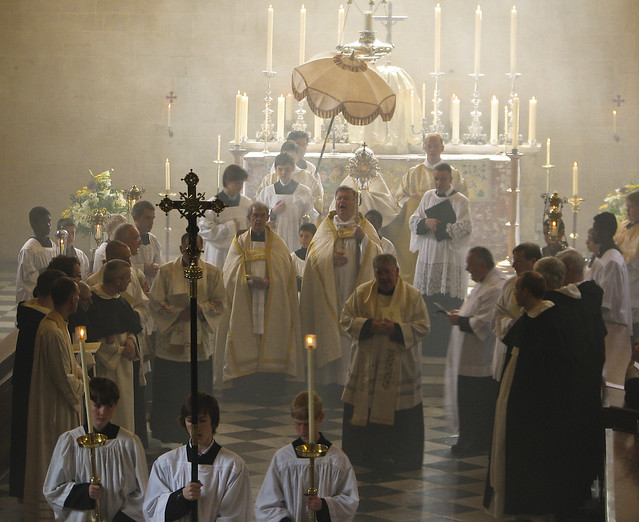
Yes, tonight we have one of those simple Gospel services for which St Michael's is renowned! And to explain it a bit, here's some theology from Wikipedia with the bits that tick boxes for me highlighted:
"In Anglican theology, a sacrament is an outward and visible sign of an inward and spiritual grace. In the Eucharist, the outward and visible sign is that of bread and wine, while the inward and spiritual grace is that of the Body and Blood of Christ. The classic Anglican aphorism with regard to the debate on the Eucharist is the poem by John Donne (1572–1631): "He was the Word that spake it; He took the bread and brake it; And what that Word did make it; I do believe and take it" (Divine Poems. On the Sacrament).
Anglicans generally believe in the Real Presence in the Eucharist, but the specifics of that belief range from transubstantiation, sometimes with Eucharistic adoration (mainly Anglo-Catholics or High-Church Anglicans), to something akin to a belief in a "pneumatic" presence (many Broad-Church Anglicans). A small minority reject the doctrine of the Real Presence altogether (Mainly Low-Church Anglicans). The oldest Anglican devotional society, the Confraternity of the Blessed Sacrament, was founded largely to promote and re-affirm belief in the real presence amongst Anglicans.
The 39 Articles argue that the doctrine of transubstantiation, as understood by those who drew up the text, overthrows the nature of a sacrament as an outward, visible sign that conveys an inward, spiritual grace. For some Anglicans, whose mysticism is intensely incarnational, it is vital that God has used the mundane and temporal as a means of giving people access to the transcendent and eternal. They consider the presence to belong to the realm of spirit and eternity, and it is not about corporeal-fleshiness, which is not to say that they accept only a "pneumatic" presence. Instead, they strongly argue to be content to allow the mystery to remain a mystery. They bristle at the idea that one material substance gets substituted for another. (Roman Catholic doctrine insists that the material substance, being part of what is open to the senses, is in no way altered, and that the philosophical-sense substance or inner reality is converted into that of the body and blood of Christ, not substituted by it.) As some Anglican divines have stated: "It may not be about a change of substance, but it is about a substantial change."
From some Anglican perspectives the Real Presence of Christ in the Holy Eucharist does not imply that Jesus Christ is present materially or locally. This is in accord with the definition of the Roman Catholic Church, as expressed, for instance by St. Thomas Aquinas, who, while saying that the whole Christ is present in the sacrament, also said that this presence was not "as in a place". Real does not mean material: the lack of the latter does not imply the absence of the former. The Eucharist is not intrinsic to Christ as a body part is to a body, but extrinsic as His instrument to convey Divine Grace. Some Anglicans see this understanding as compatible with different theories of Christ's Presence, transubstantiation, consubstantiation or virtualism, without getting involved in the mechanics of 'change' or trying to explain a mystery of God's own doing.
Anglican and Roman Catholic theologians participating in an Anglican/Roman Catholic Joint Preparatory Commission declared that they had "reached substantial agreement on the doctrine of the Eucharist".
So rejoice today in the gift of the Blessed Sacrament:
"We are now in the presence of the infinite majesty of God, who was once pleased, for love of us, to come down from heaven and become Man on earth, and to die on a cross to save us; and is now in the Blessed Sacrament, to listen to our prayers and grant us the graces we ask of him.
I adore you, O Jesus, true God and true Man, here present in the Holy Eucharist, humbly kneeling before you and united in spirit with all the faithful on earth and all the blessed in heaven. In deepest gratitude for so great a blessing, I love you, my Jesus, with my whole heart, for you are all perfect and all worthy of love.
Give me grace nevermore in any way to offend you, and grant that, being refreshed by your Eucharistic presence here on earth, I may be found worthy to come to the enjoyment with Mary of your eternal and ever-blessed presence in heaven. Amen.
I believe that you, O Jesus, are in the Most Blessed Sacrament! I love you and desire you! Come into my heart. I embrace you. O never leave me! May the burning and most sweet power of your love, O Lord Jesus Christ, absorb my mind, that I may die through love of your love, who was pleased to die through love of my love. Amen."
St Francis of Assisi
No comments:
Post a Comment